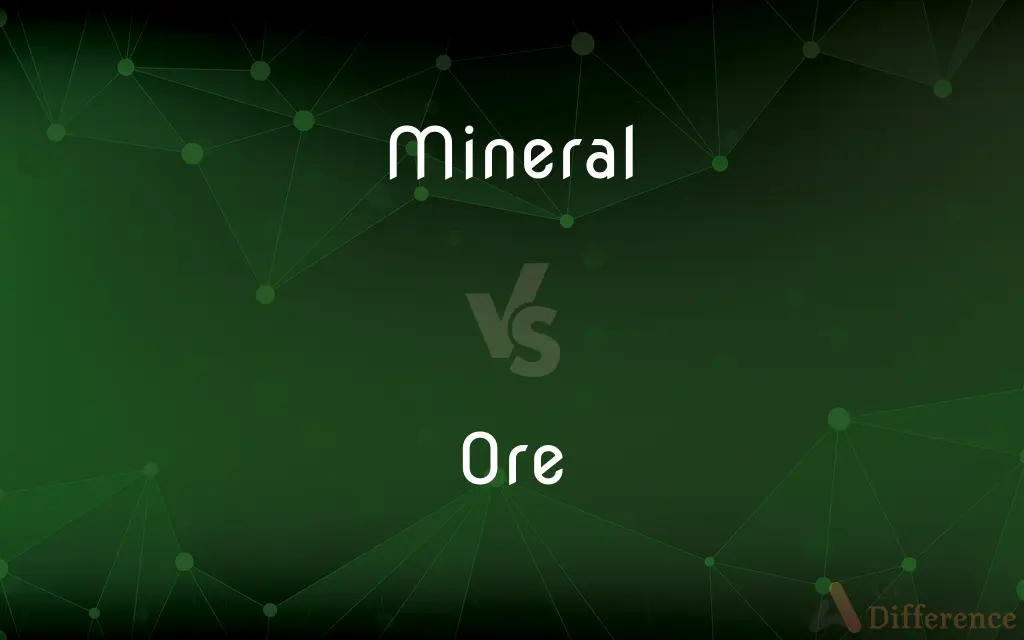Mineral vs. Ore — What's the Difference?
By Tayyaba Rehman — Updated on September 20, 2023
A mineral is a naturally occurring inorganic substance with a specific chemical composition, while an ore is a naturally occurring rock or sediment containing economically valuable minerals.

Difference Between Mineral and Ore
Table of Contents
ADVERTISEMENT
Key Differences
Minerals are inorganic substances that occur naturally in the earth and have a specific chemical composition and crystal structure. Ores, however, are concentrations of valuable minerals found in rock or sediment, from which metal or a mineral can be extracted profitably.
Minerals can be found everywhere, in soil, rocks, and even in everyday products like toothpaste or ceramics. Ores are specific types of rocks that contain high concentrations of desired minerals, making them economically viable for mining.
Every ore is a mineral, but not every mineral is an ore. The differentiation lies in the economic viability of extracting the mineral from a particular concentration.
The purity and concentration of a mineral in a rock do not classify it as an ore. Ores must be commercially viable, meaning the cost of extraction should be lesser than the profit gained from selling the extracted mineral.
Minerals have diverse applications based on their properties, from construction materials to jewelry. Ores, due to their economic value, are primarily associated with the extraction and production of metals and mineral commodities.
ADVERTISEMENT
Comparison Chart
Definition
Naturally occurring inorganic substance.
Rock or sediment with enough mineral content to be of economic value.
Composition
Specific chemical composition and crystal structure.
Contains one or more minerals in high concentration.
Economic Value
Not all minerals are of economic value.
Always of economic value due to the presence of minerals.
Occurrence
Found in various parts of the Earth's crust.
Found in specific areas with a high concentration of a particular mineral.
Usage
Varied applications based on properties.
Primarily mined for extraction and production of metals and mineral commodities.
Compare with Definitions
Mineral
Defined chemical formula: Substance with a specific chemical composition.
Each mineral has its unique chemical formula.
Ore
Contains minerals: Rock with a high concentration of one or more minerals.
The discovered ore had a high concentration of gold.
Mineral
Natural occurrence: Found naturally in the earth's crust.
The region's soil is known for its mineral content.
Ore
Source of metal extraction: Primarily mined to extract metals.
Iron is extracted from its ore, hematite.
Mineral
Varied applications: Used in a variety of industries and products.
The ceramic industry heavily relies on certain minerals.
Ore
Economically valuable rock: Rock or sediment containing enough minerals to be mined for profit.
The mine extracts silver ore from deep within the mountain.
Mineral
Inorganic substance: Naturally occurring substance that is solid and inorganic.
The mountain range is rich in several types of minerals.
Ore
Natural concentration: Natural accumulation of one or more minerals.
The region is renowned for its vast reserves of copper ore.
Mineral
In geology and mineralogy, a mineral or mineral species is, broadly speaking, a solid chemical compound with a fairly well-defined chemical composition and a specific crystal structure that occurs naturally in pure form.The geological definition of mineral normally excludes compounds that occur only in living beings. However some minerals are often biogenic (such as calcite) or are organic compounds in the sense of chemistry (such as mellite).
Ore
Economic feasibility: Must be profitable to mine and process.
The vein of ore found was so rich that its extraction was highly profitable.
Mineral
A naturally occurring, homogeneous inorganic solid substance having a definite chemical composition and characteristic crystalline structure, color, and hardness.
Ore
Ore is natural rock or sediment that contains one or more valuable minerals, typically containing metals, that can be mined, treated and sold at a profit. Ore is extracted from the earth through mining and treated or refined, often via smelting, to extract the valuable metals or minerals.
Mineral
An element, such as gold or silver.
Ore
A mineral or an aggregate of minerals from which a valuable constituent, especially a metal, can be profitably mined or extracted.
Mineral
An organic derivative, such as coal or petroleum.
Ore
A Swedish unit of currency equal to 1/100 of the krona.
Mineral
A substance, such as stone, sand, salt, or coal, that is extracted or obtained from the ground or water and used in economic activities.
Ore
Rock or other material that contains valuable or utilitarian materials; primarily a rock containing metals or gems for which it is typically mined and processed.
Mineral
A substance that is neither animal nor vegetable; inorganic matter.
Ore
Honor; grace; favor; mercy; clemency; happy augury.
Mineral
An inorganic element, such as calcium, iron, potassium, sodium, or zinc, that is essential to the nutrition of humans, animals, and plants.
Ore
The native form of a metal, whether free and uncombined, as gold, copper, etc., or combined, as iron, lead, etc. Usually the ores contain the metals combined with oxygen, sulphur, arsenic, etc. (called mineralizers).
Mineral
An ore.
Ore
A native metal or its compound with the rock in which it occurs, after it has been picked over to throw out what is worthless.
Mineral
Minerals Mineral water.
Ore
Metal; as, the liquid ore.
Mineral
A soft drink.
Ore
A metal-bearing mineral valuable enough to be mined
Mineral
Of or relating to minerals
A mineral deposit.
Ore
A monetary subunit in Denmark and Norway and Sweden; 100 ore equal 1 krona
Mineral
Impregnated with minerals.
Mineral
(geology) Any naturally occurring inorganic material that has a (more or less) definite chemical composition and characteristic physical properties.
Mineral
Any inorganic material (as distinguished from animal or vegetable).
Mineral
(nutrition) Any inorganic element that is essential to nutrition; a dietary mineral.
Mineral
(British) Mineral water.
Mineral
A soft drink, particularly a single serve bottle or can.
Mineral
(obsolete) A mine or mineral deposit.
Mineral
(obsolete) A poisonous or dangerous substance.
Mineral
Of, related to, or containing minerals
Mineral
An inorganic species or substance occurring in nature, having a definite chemical composition and usually a distinct crystalline form. Rocks, except certain glassy igneous forms, are either simple minerals or aggregates of minerals.
Mineral
A mine.
Mineral
Anything which is neither animal nor vegetable, as in the most general classification of things into three kingdoms (animal, vegetable, and mineral).
Mineral
Of or pertaining to minerals; consisting of a mineral or of minerals; as, a mineral substance.
Mineral
Impregnated with minerals; as, mineral waters.
Mineral
Solid homogeneous inorganic substances occurring in nature having a definite chemical composition
Mineral
Relating to minerals;
Mineral elements
Mineral deposits
Mineral
Of or containing or derived from minerals;
A mineral deposit
Mineral water
Decaying vegetable matter
Mineral
Composed of matter other than plant or animal;
The inorganic mineral world
Mineral
Specific crystal structure: Each mineral has a unique crystal structure.
The beauty of the mineral is often due to its crystal structure.
Common Curiosities
Can a rock contain more than one mineral?
Yes, most rocks are aggregates of several minerals.
What factors can change a mineral from non-ore to ore status?
Market demand, technological advancements, and extraction costs can change a mineral's classification.
Are all ores mined for metals?
While many ores are mined for metals, some ores are mined for non-metallic minerals.
Are minerals found only in specific regions?
While certain minerals are more abundant in specific regions, minerals can be found all over the Earth's crust.
Are all minerals ores?
No, all ores are minerals, but not all minerals are ores.
How is the value of an ore determined?
The value is determined by the concentration of the mineral, market demand, and the cost of extraction.
What makes a mineral an ore?
A mineral becomes an ore when it can be mined and processed at a profit.
Are diamonds ores or minerals?
Diamonds are minerals. However, when found in economically viable concentrations, the rock is considered an ore.
What role does technology play in defining ores?
Advances in technology can make previously unprofitable mineral concentrations become economically viable ores.
Is coal considered a mineral or an ore?
Coal is organic in origin, so it's not classified as a mineral. However, due to its economic value, it's often likened to ores.
Share Your Discovery

Previous Comparison
Afferent vs. Efferent
Next Comparison
Define vs. DescribeAuthor Spotlight
Written by
Tayyaba RehmanTayyaba Rehman is a distinguished writer, currently serving as a primary contributor to askdifference.com. As a researcher in semantics and etymology, Tayyaba's passion for the complexity of languages and their distinctions has found a perfect home on the platform. Tayyaba delves into the intricacies of language, distinguishing between commonly confused words and phrases, thereby providing clarity for readers worldwide.














































